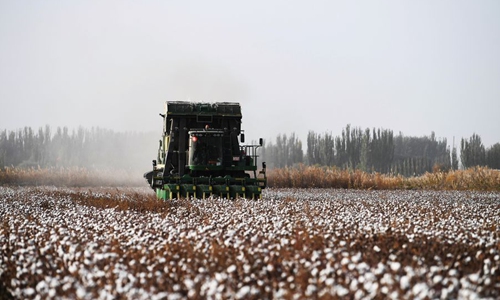HOME >> OPINION
Muslim ethnic minorities not forced to work in Xinjiang
By Li Qingqing Source:Global Times Published: 2020/1/2 21:32:38

A cotton harvesting machine is working in the field in Awat County, northwest China's Xinjiang Uygur Autonomous Region, October 24, 2019. Photo:Xinhua/Sadat
The New York Times on Monday published an article headlined "Inside China's Push to Turn Muslim Minorities Into an Army of Workers." The article said Muslim ethnic minorities in Northwest China's Xinjiang Uyghur Autonomous Region suffer from "forced labor" and the policies are designed to make them "more secular and urbanized like China's Han majority."
The article was simply distorting the facts. The development of manufacturing is the only way out for any developing country, especially for the regions that are relatively poor. Xinjiang is no exception. Western developed countries took the same path. Some manufacturing industries are being transferred to Xinjiang, which is an extension of China's manufacturing chain. Training qualified manufacturing workers is crucial to maintaining the stability and development of a region.
Today, Chinese government encourages key companies to set plants in Xinjiang. In the past few years, many high-tech manufacturing companies have settled in Xinjiang, such as SAIC Volkswagen, Guangzhou Automobile Group Co and SANY Heavy Industry Co. More and more young people in Xinjiang have become industrial workers and Xinjiang has become an important base of China's textile industry. From 2014 to 2018, 2.3147 million people in Xinjiang have been lifted out of poverty, which is very important to people's livelihood in Xinjiang.
To develop a modern manufacturing industry, sufficient and qualified manpower is of great importance. This is the reason why Chinese government has been providing training for workers in Xinjiang to make them more qualified for employment. Take the US manufacturing industry. The New York Times surely understand that the biggest problem of the US manufacturing is the shortage of labor, and many young people in the US are unwilling to work in factories. But why are some Western media telling a completely different story when it comes to Xinjiang?
Vocational training, especially in manufacturing, is something that all responsible governments should do. The US has provided vocational training for American people as well. But the Chinese government has done better and invested more than the US. Since Xinjiang does not develop as much as other Chinese regions, the Chinese government has invested more and launched more incentive policies in Xinjiang. This is a successful experience of China's development.
The New York Times also said that people in Xinjiang were forced to do their work. The US media ignored these people's hard work, as if the Muslim ethnic minorities just want to sit idle and enjoy the fruit of others' work.
Muslim ethnic minorities in Xinjiang are just like people in other parts of China. No matter what their religion or ethnicity, they want to live a good life and work hard to achieve it. People in Xinjiang are striving for decent and stable jobs and more savings for their children's education. If the New York Times said Muslim ethnic minorities were forced to work, the media either did not understand what these people really need, or was simply slandering them.
The human rights of Uyghur people in Xinjiang are not up to the US or any other Western countries. As Xinjiang region is becoming a manufacturing center in Northwest China, Muslim ethnic minorities will really benefit from the support of the central government's policies. Time will tell.
Posted in: OBSERVER